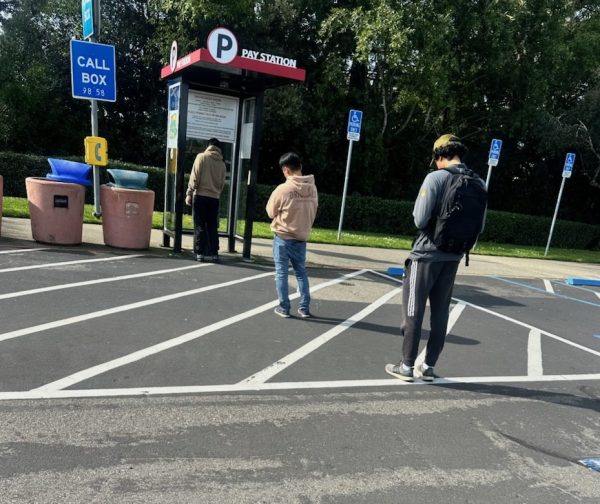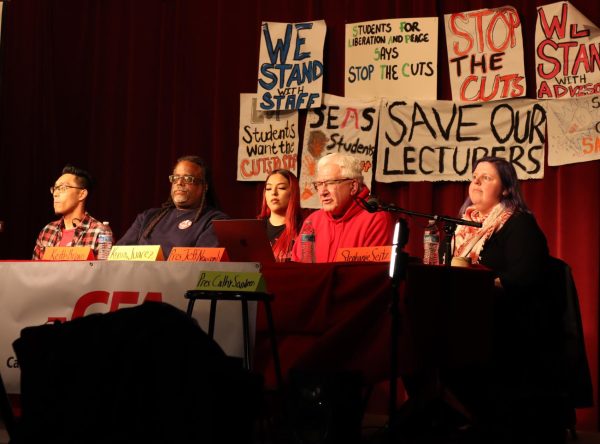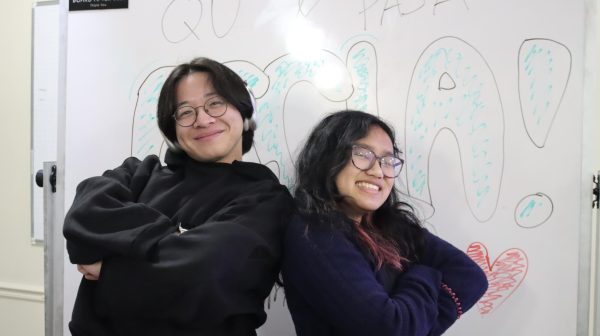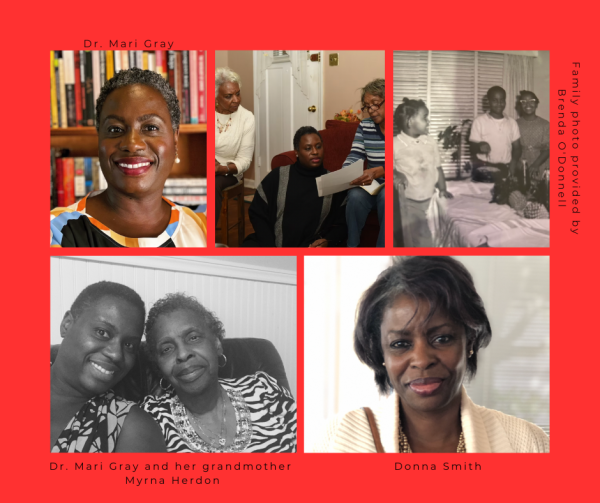Professors not immune to gender inequality
Economics Professor says she faced sexism at CSUEB
Growing up in South Korea, Jung Sook You faced misogyny that was prevalent in her society. It was believed that women had fewer brain cells than men, therefore could not participate in science or engineering. In school, boys would play sports in physical education and girls were expected to stand on the sidelines like “gossiping chickens.” Professor You was often scolded for not following these social limitations placed on women.
Many years later, when Professor You was hired to teach economics at California State University, East Bay, she says she found herself in the professional equivalent of her childhood experience.
Recent revelations that one of her colleagues has been teaching racist ideas that link supposed biological differences to intelligence have rocked the Economics Department, and also put a spotlight on claims that some of the department’s mostly-male faculty have a history of sexist hiring and treatment of women colleagues.
As with the so-called “race realism,” that Economics Professor Gregory Christainsen has been writing and teaching about for nearly a decade, Professor You and other faculty argue that misogyny is a problem in the department as well.
Professor You was hired in 2014 as an assistant professor for the Economics Department. On her hiring committee were Christian Roessler, associate professor, and Jed DeVaro, Chair of the department, among other members.
Although happy the department hired Professor You, Roessler began to question his experience on the search committee. During committee meetings and over emails, members would discuss applicants and their likelihood of success in the department. In an email on Feb. 26, 2014 to Roessler and Ryan Lampe, both in the Department of Economics DeVaro wrote “the question becomes, how much are we willing to “pay” (in terms of quality) to hire a female?”
DeVaro said in an interview that the quote in the email refers to the difficulty in hiring women, who are underrepresented in the field of Economics.
Roessler said in an interview that he questioned the claims made by some hiring committee members, often thinking, “should we really dismiss a candidate on that basis?”
“On the basis of maybe coming across as too aggressive or thinking they can’t really project authority in the classroom, because these arguments were really often made and they were usually made about women.”
Professor You said DeVaro also dismissed any positive evaluations written by students, and would repeatedly write negative comments in response like “that’s because students do not know what they are supposed to learn” or “because you [Professor You] gave away good grades.”
Since her second year at CSUEB, Professor You said she persevered with her academic duties despite constant negative remarks coming from above. Professor You managed to publish four articles while on the tenure track at CSUEB while simultaneously disputing demoralizing and discriminatory comments coming from her chair.
Some of those publications include: “Welfare Effects of Nonlinear Electricity Pricing,” in The Energy Journal in January 2017, “Optimality of the Uniform Rule,” in Economic Theory in 2018, and “Teaching Mixed Strategy Equilibrium Through a Classroom Experiment,” in the Business Education Innovation Journal in December 2019.
While Professor You managed to find success in the department, receiving promotion and tenure in 2020, she kept questioning the treatment she was receiving. That treatment included claims from the chair that said her “papers cannot be published at a journal because its quality is lower than the journal’s standards,” Professor You said, even when a paper was invited for ‘revise and resubmit.’ A revise and resubmit is when peer reviewers and a journal’s editor believe the research has merit and is potentially publishable, but with some revisions. Academics consider it a positive response to their work.
In an interview on Nov. 19, DeVaro said he has no authority to speak on personnel matters involving specific faculty.
Professor You made her treatment known to many of her colleagues and acquaintances in the College of Business and Economics, as well as to her friends outside the university who often encouraged her to take action against her chair.
Stephanie Seitz, associate professor in the Department of Management, was one of Professor You’s colleagues who encouraged her in her fight.
“I tried to support her emotionally,” Seitz said in an interview, “because it is traumatizing to have someone say things about you that crossed the line of professionalism, and also when those things are sort of accepted, you know, by people higher up.”
Roessler said Professor You came to him asking for advice and his perspective on the treatment she was receiving. Initially, his advice to her was to do what you can to build a good relationship with your chair, but now realizes the harm that might have done.
“In hindsight, when you know that those things didn’t work, despite the person trying, I see that there’s a certain unfairness in doing that,” Roessler said in an interview. “You’re putting the burden on this one person and saying that there’s something you can do, you just gotta work more and work harder, but what we’re really saying is work more, work harder than everybody else, and that’s just not fair.”
In September 2020, Professor You wrote a formal letter to the Dean of the College of Business and Economics, George Low, in which DeVaro was quoted multiple times on his comments made about female faculty members. He was quoted saying, “Jung poses an ongoing liability to the Department’s programs… It is increasingly difficult to determine where to place her in the schedule, where she will do the least damage to the programs.”
The Pioneer has reached out to Low for comment. He will be leaving CSUEB at the end of the semester for a position at Georgia Gwinnett College.
While DeVaro could not comment on personnel matters, he said he has fully supported female colleagues and denied any sexist treatment.
DeVaro said he is frustrated with trying to hire female faculty members because they are in such high demand across the field of economics.
The American Economics Association’s Committee on Equity, Diversity, and Professional Conduct reported its first climate survey in September 2019 which gathered input from all students, faculty, and respondents working in economics outside of academia. The results were shocking, but to those in the field, not surprising.

The survey found that on average, men in the field of economics older than age 55 outnumber women five-to-one, while men age 54 and below outnumber women two-to-one. Women in economics face significantly more discrimination and unfair treatment than men along all dimensions, the report stated.
The report highlighted multiple open answers that were received during the course of the survey, and one stated that “[w]omen and POC may not be overtly treated poorly, but they are not encouraged and supported as are white men. This lack of encouragement could take many forms, including lack of enthusiasm for one’s research efforts, failure to provide support and information about research leaves and conferences, and a simple lack of respect for one’s opinion at faculty meetings.”
Professor You said she had a much greater workload than her male counterparts, which caused her enormous stress. The effects on her mental, emotional and physical health often made her consider quitting, but instead she stayed to fight against discrimination.
“I am not a victim anymore but I have become someone who needs to be responsible for improving the workplace,” Professor You said in an interview. “However painful the work experience was for me in this department, I prefer not to dwell on it but instead move forward.”
DeVaro was appointed Chair of the Economics Department in 2012 and is up for reappointment at the end of the year. A letter is currently circulating among faculty members asking Edward Inch, Provost of CSUEB, to not reappoint DeVaro as Chair for these reasons:
“DeVaro’s support of Professor Gregory Christainsen’s research and teachings that prominently feature racist themes…DeVaro’s use of sexist language and hiring practices…rule violations DeVaro has committed, particularly in conducting the department retention, tenure, and promotion process…and DeVaro is a regular member of the Management Department not a regular member of the Economics Department…He has contributed to an inequitable and exclusionary departmental and campus environment, and for these reasons should not be reappointed as Chair of the Economics Department.”
DeVaro denies any claims of sexism. He said there is a false narrative going around that is unfair to him and damaging to the department.
“I have treated all my faculty members fairly and equally,” he said in an interview. “And it saddens me to think that any member of the department would feel that they have faced a hostile work environment.”
DeVaro said his career has been spent researching and publishing work focused on gender issues in the economics field. During his time at Cornell University, he mentored two female PhD students and invited them both to work on papers with him. He published two different articles with each PhD student, which are some of his highest cited pieces of work.
He said his efforts to mentor and actively involve women in his work was a way he tangibly contributed to the career advancement of women.
“I’ve always prided myself in working very hard to combat that [the underrepresentation of women in economics]” DeVaro said.
According to the Economics Department Gender Breakdown, female students made up an average of 32 percent of all undergraduate and graduate students in the Economics Department over the last five years.
Roessler believes there needs to be a better support for women and people of color in the department, support that isn’t in place now.
“I would very much like us to be able to say ‘look, how can we be available outside the classroom for you’ because that would be very helpful, especially when you have students who may naturally feel that there’s a barrier,” Roessler said in an interview. “Students are not going to bring issues up if they don’t trust you or if they don’t have that kind of relationship with you.”
DeVaro said he has had trouble hiring women in the department for years, not as a result of any sexist bias, but instead as a reflection of the discipline. Women in economics are relatively scarce, which consequently puts them in high demand for universities when trying to promote diversity and equity.
As Chair, he pressed the Provost and Dean to get CSUEB to make three simultaneous job offers to three female candidates during one of the last hiring cycles. All three women turned down the job offers, according to DeVaro, for higher paying jobs.
“With the cost of living in the Bay Area being so expensive, and the CSU pay cap on faculty’s salaries, it’s been incredibly hard for us to compete,” DeVaro said. “Maybe we’re just not offering enough money.”












